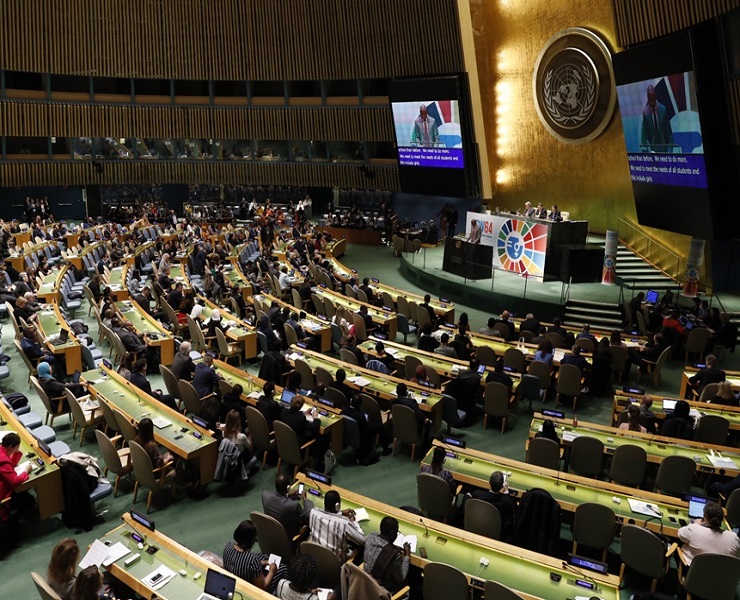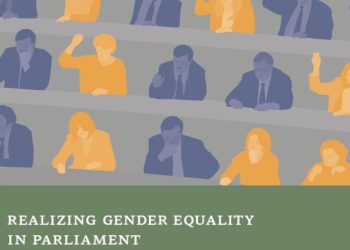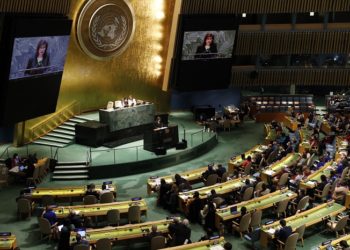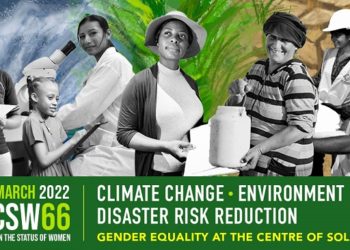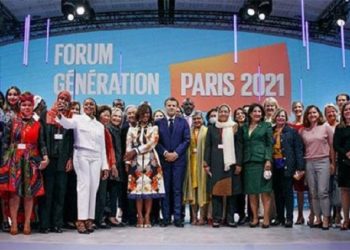UN member states agreed on a political declaration
The main outcome of the 64th session of the Commission on the Status of Women held on March 09, 2020, in New York, was the adoption of the Political Declaration on the occasion of the 25th anniversary of the Fourth World Conference on Women, whereby member states reaffirmed their political will to fully implement the Beijing Declaration and Platform for Action and vowed to strengthen their efforts towards this end.
Taking into account the situation due to the COVID-19 pandemic, the Commission had decided to restrict the agenda of the session to a one-day procedural meeting with only the participation of New York-based delegations and representatives of civil society organizations. Multiple events that were traditionally held in parallel in New York at the initiative of thousands of representatives of non-governmental organizations arriving from everywhere in the world had to cancelled as well.
As for the agenda of the 64th session of the Commission on the Status of Women, as was planned, it was entirely devoted to the appraisal of the process of implementation of the Beijing Declaration and Platform for Action adopted in 1995, as well as to the establishment of future steps to be taken.
Member states reaffirmed their commitment to the implementation of the Beijing Platform for Action, ensuring progress, and eliminating gaps. While welcoming the progress made in the previous years towards the implementation of the Beijing Declaration and Platform for Action, the political declaration by member states expressed concern that, overall, progress made has not been fast or deep enough. In some areas, progress has been disproportionate, structural obstacles, discriminatory practices, and feminization of poverty have remained in place.
“25 years after the Fourth World Conference on Women, no country has fully achieved gender equality and the empowerment of women and girls, that significant levels of inequality persist globally, that many women and girls experience multiple and intersecting forms of discrimination, vulnerability and marginalization throughout their life course,” the Political declaration states.
Reaffirming their political will to implement the Beijing Platform for Action, leaders have acknowledged that new challenges have emerged that require stronger and more coordinated efforts and actions, particularly:
- ensuring the fulfillment of the right to education for women and girls, especially in sectors in which they are not equally represented, in particular science, technology, engineering and mathematics /STEM/;
- Ensuring full, equal and meaningful participation in decision-making as well as equal access to leadership and representation for all women at all levels and in all spheres of society.
- Ensuring women’s economic empowerment, including accessibility of dignified work, equal pay, social security and accessibility of financial resources;
- Eliminate the disproportionate burden of unpaid work related to work within the household and care for family members;
- Finding solutions to reduce the disproportionate impact of climate change and natural disasters on women and girls;
- Eliminating, preventing and responding to all forms of violence and harmful practices against all women and girls;
- Strengthening the protection of women and girls in armed conflict and participation of women in peace processes and mediation efforts;
- Strengthening efforts to realize the right to the enjoyment of health for women and girls with an emphasis on the accessibility of universal health coverage;
- Addressing hunger and malnutrition among women and girls.
World leaders have also pointed out current gaps and challenges as well as concrete actions to address them. These include the following:
- Eliminating all discriminatory laws and structural barriers;
- Eliminating all discriminatory social norms and gender stereotypes, including in the media;
- Matching commitments to gender equality and the empowerment of women and girls with adequate financing;
- Strengthening relevant institutions promoting gender equality;
- Harnessing the potential of technology and innovation to improve the lives of women and children;
- Closing data and evidence gaps through regular collection, analysis, and use of gender statistics;
- Strengthening international cooperation to implement commitments to achieve gender equality.
The Declaration also reaffirms that gender equality and the empowerment of women and girls will play a key role in ensuring progress towards the implementation of all SDGs, which is especially relevant ahead of the UN Decade of Action (2020-2030).
Immediately after the session, at the initiative of the Women’s Rights Caucus, a number of non-governmental organizations developed an alternative feminist declaration, which particularly noted: “Reaffirming previous commitments to the Beijing Declaration and Platform for Action is not enough. To reach gender equality, we must support feminist movements and adopt a progressive and bold agenda that will address challenges faced by all women and girls.”
It should also be noted that during the 64th session, the UN Secretary-General presented a report on the implementation of the rights of women (E/CN.6/2020/3), which is based on the analysis of global data.
Ahead of the UN session, governments of 171 countries, including that of Armenia, presented their national reports, while hundreds of activists from civil society groups took part in reviews of national and regional assessments, NGOs of many countries developed alternative reports about the Beijing Platform for Action.
Based on the UN Secretary-General’s report, the UN Women office published the Gender equality: Women’s rights in review 25 years after Beijing report based on the review of progress and barriers to women’s rights since the adoption of the Beijing Declaration and Platform for Action. The report states that since the adoption of the Beijing Platform for Action certain progress has been achieved in relation to the rights of women and girls. Currently, there are more girls studying in schools, fewer deaths during childbirth than ever before, while the share of women in parliaments has almost doubled all across the world. In the last decade, 131 countries have adopted laws aiming to support equality for women. However, the progress has been very slow and disproportionate.
Globally, the progress for female participation in the labor market has stalled during the last 20 years. Only two-thirds of women between 25 and 54 are employed, while 93% of men in that age group have employment.
Nowadays, women continue to bear the main burden of providing care for other family members and doing unpaid work in the household and receive, on average, 16% lower wages than men. Moreover, in some countries this figure is almost at 35%.
- Last year, almost every fifth woman (18%) faced violence by their partners. New technology makes new forms of violence possible, i.e., online extortion, against which there are largely no political measures.
- 32 million girls are to this day out of school.
- Men continue to occupy three-fourths of the seats in parliaments.
- Women are mostly left out of peace processes, making up only 13% of participants in negotiations and only 4% of signatories.
While speaking of the process of implementation of the Beijing Action for Platform, Executive Director of UN Women, Phumzile Mlambo-Ngcuka said: “The review of women’s rights shows that, despite some progress, no country has achieved gender equality. Equality isn’t just one quarter of the seats at the tables of power. But that’s the current reality of women’s representation, across the board. Men are 75 per cent of parliamentarians, hold 73 per cent of managerial positions, are 70 per cent of climate negotiators and almost all of the peacemakers. This is not an inclusive and equal world and we need to take action now to create one that does not discriminate against women. Only half is an equal share and only equal is enough…”
The session’s documents can be found through the following links:
- The text of the Political Declaration adopted during the 64th session of the Commission on the Status of Women
- The UN Secretary-General’s report during the 64th session of the Commission on the Status of Women
- The national report of the Republic of Armenia on the implementation of the Beijing Platform for Action
- Gender equality: Women’s rights in review 25 years after Beijing report by the UN Women
- Report by UN Economic Commission for Europe (UNECE) member states, Geneva, 29-30 October 2019
- Report of countries of the Economic and Social Commission for Asia and the Pacific and Armenia’s statement, Bangkok, 27-29 November 2019




